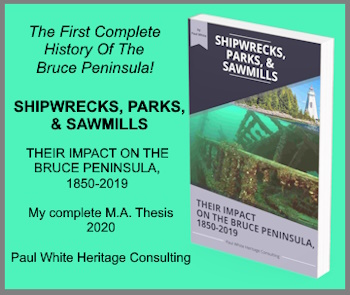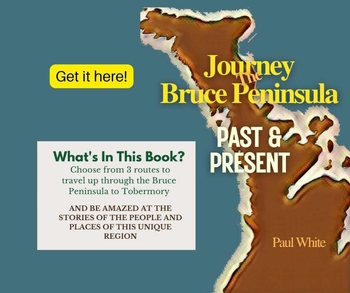SUBSCRIBE TO "THE GREAT LAKES RACONTEUR" & GIFT IT ->
- Home
- Owen Sound
- Ethnic Groups
Ethnic Groups: A Large Part in Owen Sound's History
Ethnic groups played an important role in the history of the development of Owen Sound social and economic fabric.

Last Weekend, I attended a Heritage Marketplace sponsored by the Ontario Historical Society at its annual conference held in Chatham. Among the organizations promoting themselves was the Chatham Kent Black History Society.
After discussing with them some of the projects that they had undertaken, and relating to them stories about some of the exploits of early African-Canadians in the Grey-Bruce region, and elsewhere in the province, I began to think more about the contributions of other non-Anglo ethnic groups to the settlement of this region. At the same, I considered the attitudes of the dominant sector of the population towards these groups.
The 1851 census for the County of Grey listed four people of African heritage, one person from Malta and another one from the West Indies. We cannot be sure that these individuals were not Anglo Saxons, nor can we assume that those listed as coming from the United States, New Brunswick or, for that matter England, were necessarily of Anglo-Saxon descent. Therefore, it is not possible to dismiss these groups as irrelevant to the growth and development of our community.
Later census data reveals the migration of other ethnic groups to Owen Sound and the Grey-Bruce region.
As Greeks, Jews, Italians and Asians settled here, they became an integral part of the community. Today, we take for granted that out neighbours may not celebrate the same religious holidays, have the same mother tongue, or even have the same skin colour. In the early days, these differences were noted and accepted.
For example, when the ship, the Waubuno, sunk between Collingwood and Parry Sound in 1879, the Wiarton Echo, and other area newspapers, listed the names of the passengers and crew, who had lost lives in the mishap. One of the names listed was of George Hall of Owen Sound. Beside his name, in brackets, was the word coloured. Similarly, when other maritime tragedies were reported in the list of casualties, native women who had who had perished had the word "squaw" appended to their name.
Please don't come to the conclusion I am accusing our pioneering ancestors of some insidious prejudice. This practice was simply the norm for that era. That's not to say that it was fair-minded and acceptable.
The Chatham Kent Black History Society was excited to learn that one of the first settlers to Owen Sound was Isaiah Chokee, an African Canadian who came to this area as the cook on W. Boyd's ship, the Fly. Chokee played an integral role in this early settlement. It was he, who risked life sailing under often perilous conditions to other ports on Georgian Bay to gather supplies to sustain the community.
Therefore, his role is as important as some of the more prominent pioneers that we historians often write about.
Similarly, other Owen Sounders of various ethnic groups have made valuable contributions to the lifestyle and development of this community. These families and others of other ethnic background have contributed to the social and political fabric of this city.
Why have I written this column about the ethnic groups that helped to develop history of this community? It's simple. I want to make all of my readers aware that Owen Sound has a culturally diverse history and, to promote that sense.
A version of this article originally appeared in my Local History column in the Owen Sound Sun Times.





